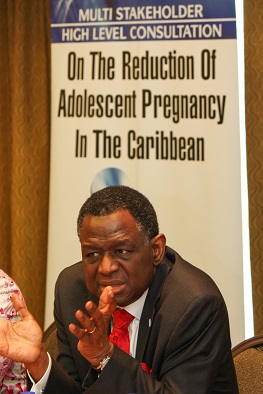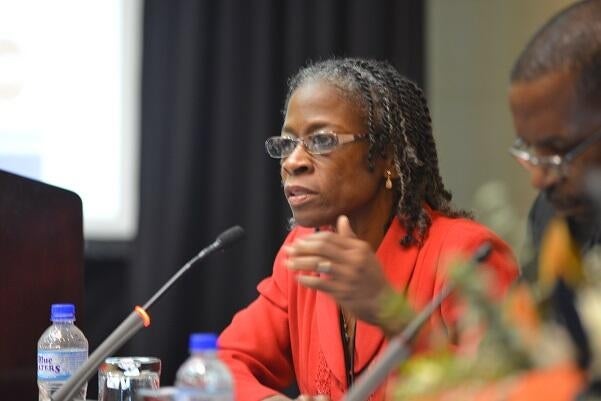Dr. Zoe Simpson - Acting Executive Director Women’s Centre of Jamaica Foundation speaking at theMulti-Stakeholder High Level Consultation on the Reduction of Adolescent Pregnancy in the Caribbean
Since the Women’s Centre of Jamaica Foundation was established by the government more than three decades ago, it’s helped more than 40,000 teen mothers and has become an example of best practice for similar organisations around the world. But the organisation still struggles to meet 100 % enrolment in its package of programmes that includes tutoring in secondary school subjects, counselling, training in parental skills and day-care.
The stigma still associated with being a young mother and a lack of support from the girls’ parents are just two of the things that keep possible beneficiaries of the foundation’s programme away.
Acting Executive Director of the foundation Dr. Zoe Simpson and other representatives of government and non-governmental organisations dealing with adolescent sexuality and pregnancy in the English- and Dutch-speaking Caribbean shared their achievements and their challenges at a regional meeting earlier this week in Port of Spain, Trinidad & Tobago.
“We’re working with the girl, but we also have to work with her parents,” said Dr. Simpson, describing one challenge. “In many instances the parent of the girl was also a teen mother and probably didn’t access intervention that would help her to get her life back on track.”

The Multi-Stakeholder High Level Consultation on the Reduction of Adolescent Pregnancy was organised by the UNFPA and the Caribbean Community (CARICOM) with support from the Government of Trinidad & Tobago and brought together representatives of the public sector and civil society to help shape a strategic framework to combat a problem that UNFPA Executive Director Dr. Babatunde Osotimehin said needed to be dealt with a “sense of urgency”.
One in five women in the region has reported getting pregnant before the age of 19. Adolescent childbearing is only a worse problem in the poorest parts of Africa.
Dr. Osotimehin told a group of youth representatives, during a special dialogue with them at the consultation, that the UNFPA’s position is that grassroots effort, which reaches individuals directly, was the key to solving the problem.
“A young girl who is in a rural community, if you look at what $100 does for her it’s simply amazing – it transforms her life,” said Osotimehin.
The UNFPA is helping governments and NGOs across the region transform lives and there have been signs of success. While Jamaica still has one of the highest adolescent fertility rates in the region, it has fallen considerably since the Women’s Centre started operating, said Simpson, dropping from 31 % in 1978 to 20 % in 2000 to 18 % in 2008. The centre now has 16 locations around Jamaica. Only two per cent of girls who attend the programme have a second pregnancy and most successfully complete their secondary school education after their pregnancy.
In Guyana, a “comprehensive empowerment programme”, started in 2008 by an organisation called Women Across Differences, has also steered young mothers back to education, given them training and better employment prospects and kept them from having further pregnancies.
Most of the 204 girls who have gone through the programme have joined family planning clinics and have not had additional pregnancies, said Clonel Samuels Boston of Women Across Differences. Seven of them have successfully sat the Caribbean O’Level exams and three are attending the University of Guyana.
“If it were not for this programme then I may have found myself being a mother of five or more children, struggling to survive. I would not have achieved all that I have so far,” said Tiffiney Tyrrell, who had two children by age 17 and is now a graduate of the empowerment programme. She’s also a co-facilitator, advisor and assistant skills trainer with Women Across Differences.
Despite their successes, the groups face a long list of challenges, including a lack of funding, internal capacity and support from other public and private institutions.
Dr. Simpson said more research into the root causes of and most effective approaches to the problem of adolescent pregnancy in the region is needed.
She said employees of organisations who provide family planning services to young mothers need specialised training because bad experiences keep the girls from accessing these services.
Dr. Simpson recommends that similar organisations within the region reach out to each other and learn from each other. Sharing of best practices is one of the core recommendations in the strategic framework discussed at the consultation.
Samuels Boston said the demand for Women Across Differences’ empowerment programme is greater than what the organisation can accommodate. More public and private support is necessary to give opportunities to young women whose education was interrupted by pregnancy, she said.
“The programme has made significant impact in the lives of our adolescent teenage mothers, since many of them have come to view themselves as individuals of worth and have great plans for their future,” she said.


